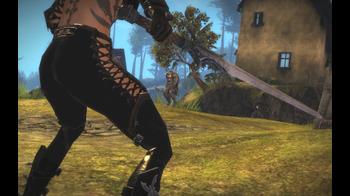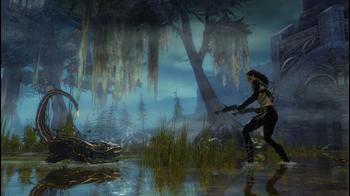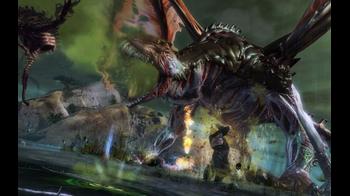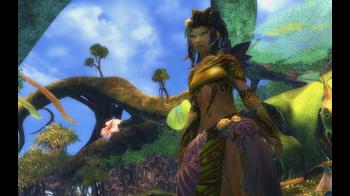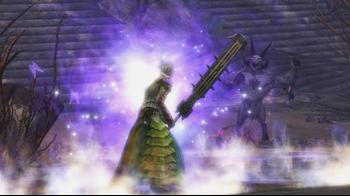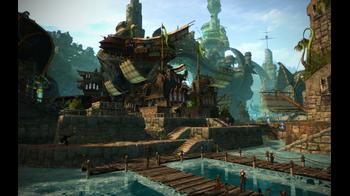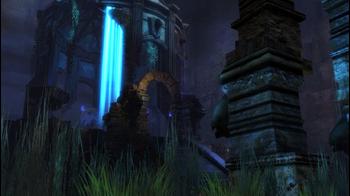
Guild Wars 2 Review
Beyond the lands you know and are familiar with, beyond the notions and understanding that you’ve known, and beyond the norm and monotony of MMORPGs, Guild Wars 2 throws itself into the genre as an outsider of sorts. Having caught the entire fanbase of the first game and MMORPG fanatics, the game has a lot to live up to.
Interview after interview and video after video ArenaNet preached about the game’s wonderful combat, lush world, exquisite quest design, and a compelling narrative to keep you moving forward. All of these ideas sound good on paper - or by ear - but the real issue is can ArenaNet rise to the challenge of fulfilling their vision? However, more importantly, does Guild Wars 2 truly change how MMORPGs should play or is it just treading familiar territories?

Tyria is in danger. Centuries have passed since the previous game and much has changed for better or for worse, but mostly the latter. The Elder Dragons, a force with unparalleled power, has awoken from its slumber and ravages the continent with their destructive abilities. Zhaitan, one of the younger Elder Dragons awoke from its slumber in the sunken city of Orr. Raising up the entire landmass along with an army of undead, Zhaitan uses his horrifying abilities to terrorize Tyria. In addition, other Elder Dragons and their armies also wreak havoc in various parts ot world creating mass chaos.
In this time of great peril, all races unite under a common goal: to destroy the Elder Dragons. You as the player can choose one of five unique races that are available in Guild Wars 2 to partake in this war against Zhaitan. Ranging from the diminutive creatures known as the Asura to an animal-transfiguring race known as the Norn, each feel completely different with its own set of lore and background.
For instance, the Asura are technologically gifted and have the most advanced gadgets available. Decked out with fancy scientific gizmos, their capital Rata Sum appears like a diabolical lab with energy flying around everywhere. On the contrary, the barbaric but warring feline race known as the Charr look dastardly menacing. Using guns and destructive war machines, the Charr gives a sense of a warmongering nomads that destroy wherever they go.
The distinction between these various classes are important as it lends to the diversity yet, consistency Guild Wars 2 has to offer. For instance, while each of these appearances appear to be different and have different stories to tell, they play identically. This means, that you are choosing a race not because a class is associated with it but because it’s the race you truly want to play.
From the moment you enter character creation you are making choices that permanently affect you for the entire game. The Sylvari are plant-like humanoids that often dream with nature. Depending on what you chose for you dreams when creating a Sylvari, they will affect what story quests, also known as Personal Story, you encounter. This gives a lot of diversity and gives an incentive to try out the other choices for the same race when creating a character.
Personal Story quests are littered throughout your journey from level 1 to 80 and offer a compelling narrative where you the player really matter. At the end of one personal story I had to choose a method of retrieving a stolen sword. I could’ve chosen a more stealthy option of claiming it or much more forceful way.
Choices in Personal Stories matter because it dictates how you wish to play and how you wish to approach storylines, and there are tons of them. Whether it’s how you tackle a mission to joining or abandoning groups/allies, Guild Wars 2 creates situations and choices as if they have the utmost importance. It’s this portrayal that sets Guild Wars 2 leaps and bounds above every other MMORPGs that tell a narrative.
In addition to the main narrative through Personal Stories, the game does a great deal of world building through quests, also called Dynamic Events, and conversations that NPCs have which happened to be fully voiced by the way. Each encounter and conversation heard gives more insight about popular celebrities in Tyria, the relationship among the races, issues other than the Elder Dragons, and more. Despite the grand main story, Guild Wars offers tidbits of other stories that bring the world to life. Using this it’s easy to immerse yourself into Tyria and just sit around and listen to simple gossip in a local town.
Destiny’s Edge is a former guild consisting of the strongest warriors in all of Tyria spanning various races. Before you enter into the world in a blaze of glory, Destiny’s Edge held immense power, enough to rival and defeat an Elder Dragon. Sadly the guild disbanded and its members have done little to maintain contact, or their friendship, with each other. Bitter over a certain event, you serve as the catalyst in bringing this guild back together. Although your role in saving Tyria is important, as it’s laid out in the Personal Story, Destiny’s Edge is also. Utilizing dungeons, you get to gleam into Destiny’s Edge’s past as well as their struggling friendship and enmity towards each other. It’s compelling and the way its laid out is believable.
Despite the narrative in Guild Wars 2 being epic and grand there are numerous faults that becomes instantly known. The game throws you into the narrative fray and expects the player to know certain details. If this isn’t the case then a critical detail that helps to understand the story isn’t available until later on. One example is the story of Destiny’s Edge. Their disbandment is not told until a you’re level 50 or beyond. It’s hard to care about characters when you’re not given a background on what exactly happened.
Additionally, the story itself feels like a series of random side quests don’t really contribute to the war against Zhaitan. You’re defeating armies of undead, recruiting allies, and more but the impact isn’t there and as a result it doesn’t leave a lasting impression.
Gone are the traditional form of questing in Guild Wars 2. Rather than using a conventional means of entering a town and grabbing all the quests that it has to offer, complete them, and return for the reward Guild Wars 2 executes the idea differently.
Dynamic Events are the new way of questing and rather than talking to an NPC to start it, you can easily find one happening as you are wandering around the various zones in the game.
Take the open field of Queensdale. There are various construction sites in the area but they are often taken advantage of by dangerous creatures or bandits. Instead of doing something to trigger these quests, you can come across a network of pipes being sabotaged or Harpies terrorizing the dam workers. It’s an intriguing notion to just randomly come across a dynamic quest.
Dynamic Events range from various tasks just as escorting, defending a terrorized town, hunting down animals, and random mini-games. While some dynamic events are just one events, there are many that lead to another creating a series of Dynamic Events. Take for instance a Hylek town that is being destroyed by a local insurgent group. By failing to protect the town, the Dynamic Event ends right there, however, if you succeed the Hyleks will pursue their enemies and a new Dynamic Event featuring revenge will begin. These quests give incentive for players to truly care about the narrative background of Dynamic Events as well as sticking around for possibly another event. It’s clever and it keeps that momentum of questing going.
However, perhaps the most interesting Dynamic Events are the meta events. These are much more different in that it directly affects the zone you are playing in. Sparkfly Fen is an area highly infested with undead. A meta even can kick off that infests various zones with undead and your job is to hold them back as well as preparing for an undead siege. Eventually the event will end with a gigantic boss that requires dozens and dozens of players to defeat. These meta event bosses exist on almost all of the maps and are quite a treat. By succeeding you prevent the area from becoming more difficult as well as create more areas where enemies aren’t inhabiting them While these changes aren’t permanent, they last for quite a while leaving that lasting impression on you.
What’s possible with Dynamic Events that’s different from other questing systems in MMORPGs is the idea of banding multiple players together for a single goal. This means that you’re no longer questing by yourself or waiting for enemies to spawn just to get it stolen by others. Guild Wars 2 throws that notion out the window and emphasizes on togetherness.
When Dynamic Events occur, most of the time it won’t be just you participating in the event. Players from various locations of the zone will come together to aid you in finishing. This is all because of how Guild Wars 2 allows everyone to reap the same rewards. Everyone gets loot together, everyone receives experience, and everyone receives other rewards. The game actually encourages players to play with each other ad hoc and it’s fun to do so. After all, this is an massively multiplayer game and I should be playing with others, not just by myself.
Although this organic groupmaking is intuitive and brings out a new method of playing, Dynamic Events have some severe flaws that stand out. Despite the difference in execution, Dynamic Events are still the same quests that MMORPGs use. You’ll still be killing things, gathering things, etc. The impressive aspect is that it’s disguised extremely well to prevent players from noticing that. However after a long while of doing the same types of Dynamic Events, this flaw comes to light and it’s hard to get over the repetitive cycle of questing.
Dynamic Events also promote the ease of zerging. While not all Dynamic Events succumb to zerging, numerous events will involve dozens of players just mobbing together and destroying enemies left and right. It feels mindless and thoughtless. Due to the way the game’s designed, there’s not punishment for mindless being part of a zerg train and as a result, the game can get easily boring if not monotonous.
The last problem with Dynamic Events is that they either occur extremely frequently or they rarely occur at all. Due to how the population of the game isn’t dispersed well many of the lower level areas will have events restarting often, however, beyond this they rarely occur. This poses a severe problem as it becomes difficult to level and have the fun of questing. In addition, technical problems render many of the events to be bugged making them outright unplayable.
Just wandering around in a zone and hopefully running into a Dynamic Event sounds boring, and somewhat directionless. As a result there are Renown Hearts that are scattered throughout a given zone.
These act more like traditional quests in a sense that you are tasked with something and they will always be there, meaning they’re static. Additionally, they happen to be located so that if a Dynamic Event occurs you’ll be notified immediately. Essentially Renown Hearts serve as points to gather people and get them to notice a Dynamic Event as well as presenting them with something to do in the meantime. Sadly, these objectives feel tedious, boring, and feel like they drag on for far too long. Simply put they’re a necessary evil because without it the Dynamic Events structure would fall apart almost completely.
Beyond the questing content in PvE, players also have the option to tackle numerous dungeons in the game, of which there are eight in total. Each offer a story and is interesting, however, these instances are no pushovers. Forcing you to rally as a group of five, you must venture from beginning to end with enemies that with either make you or break you. The tough fights can sometimes drag on but have a feeling of reward as you must use various strategies to come out alive in each encounter. Additionally the various bosses that each dungeons house require a certain level of trial and error to defeat. Knowing is everything and in dungeons it helps to keep you alive if you know what you should be doing. Sadly, the dungeons are a tad disappointing as the strategies you employ sometimes bog down to just running around in a circle using long ranged weapons until enemies/bosses are dead. It’s a bit brainless and a cheap method of making the game’s content harder.
Dungeons, Renown Hearts, and Dynamic Events aren’t the only content that’s available in a given zone. Points of interests, Vistas, and Skill Challenges are all sites of attraction and by visiting any of these locations you will receive experience. Points of interest are just locations that are of importance such as a town or a waterfall. They’re fairly easy to reach. On the other hand Vistas require you to climb high to reach a location giving you a magnificent view. Finding your way to reach a Vista make take a bit of effort but the spectacular view is worth it - as well as the hefty sum of experience of reaching it.
Lastly, Skill Challenges are areas where you can acquire skill points after completing a certain objective. All of these distractions make up a zone and if you end up unlocking everything you will receive items, money, and experience. Essentially, checking out everything will reward you greatly.
Traveling will yield great rewards and leave you satisfied with the game but combat is where the heart of the action lies. Long gone are the days where you stand still and whacking each other in boring, monotonous combat systems. There are a total of eight different classes to choose from and all of them use an intuitive skill system. Rather than having dozens at your disposal, the game locks you in with 10 skills, each with their own use. The first five skills are designated by the weapon you’re holding and will act as your primary damaging skills. However, the twist is that you have the option to hold two sets of weapons and can switch them out in combat at will. Rather than having five weapon skills, you in reality have a total of 10, making your arsenal that much stronger and versatile.
In addition to your primary weapons skills, the remaining five act as your healing, utility, and elite skills which are unlocked over time. These skills have longer cooldowns than your weapon skills but adds the “oomph” to your class giving it a distinct feel. They also act as your lifeline in ways that you would never imagine. Skills are the heart of the combat system and because of its relatively quick cooldowns and the emphasis on which weapons and utility skills to bring, builds are a huge focus in the game.
If you are ever in combat run out of health, your character goes into a downed state. In this mode, your character can’t move or escape but you have four skills specific to the downed state that you can use to fight back in a last ditch effort. If you manage to kill an enemy you’ll rally back up with a bit of your maximum health.
It’s an interesting mechanic but the horrible camera controls and the minor impact downed state has in battle make the mode a bit gimmicky. Still, it keeps you from permanently dying forcing you to respawn at a nearby waypoint.
All of the combat goodness doesn’t come at a price due to Guild Wars 2’s smart scaling system. Although you level up and grow stronger, you still have the ability to experience lower level zones in a compelling fashion. Once you’re in a zone of lower level, you will be scaled down accordingly so that the enemies that lurk within will give you a challenge. Exploring lower level zones then yield great rewards considering you will still receive an appropriate amount of experience as well. Additionally, the loot is scaled to your level so if you’re level 80 you will get items based around that level. It’s awesome and makes any content at any point in the game enjoyable.
The visual art is stunning as your trek across Tyria is a splendorous view. Whether it be the incredible scenery or the gorgeous art that accompanies the combat, Guild Wars 2 is littered with both technical and stylistic art that gives other MMORPGs a run for their money. Colors flourish no matter where you go and each zone feels distinct from each other. What results is a realistic world that truly has various distinguished geographical features. You could be climbing the vast peaks of the Shiverpeak Mountains or tunneling through an underground cavern in Kryta. The details are impeccable and the way the landscapes are drawn out makes it as if it truly is one huge painting. Is absolutely magnificent.
The audio is amazing to boot with large fanfares booming whenever you fight to the light orchestral sonnets that play when exploring the world. The music by Jeremy Soule is remarkable to say the least. The songs truly tell a story of their own especially when combined with the narrative aspect of the game. The mysterious and ominous tone that the violins play to the the booming of drums when you’re in peril is all fantastic.
Along with the beautiful soundtrack, the voicework is also well done. Although the delivery for certain characters are iffy and annoying, every important person delivers their line with polish and finesse. If there’s any problem with the game’s voicework is that it uses the same voice actor numerous times and it can get quite tiresome.
To say that it revolutionizes the genre might be saying much but to start the wheels of innovation going is a more adequate definition for Guild Wars 2. Rather than implementing drastically new ideas, Guild Wars 2 attempts to rethink how old MMORPGs should play. Do you want to quest by clicking on NPCs with exclamations on their head and run around doing fetch quests? No? Guild Wars 2 has the solution to that: Dynamic Events. Do you want to enjoy an endgame from beginning to end? Yes? Guild Wars 2 offers that. Guild Wars 2 is a response to the genre saying, “We’ve come here to stir the pot and change things up” and is asking for others to join suit. By that token, Guild Wars 2 is a true accomplishment as it ceases to exist not only as an MMORPG but a game that anyone can join as a whole.

